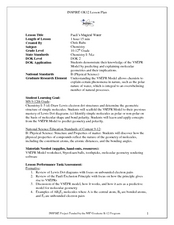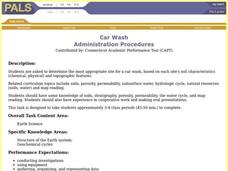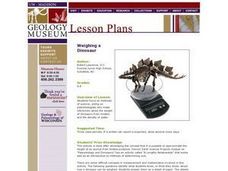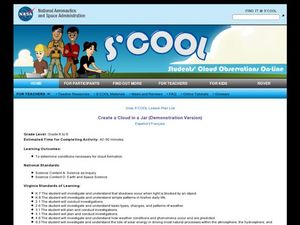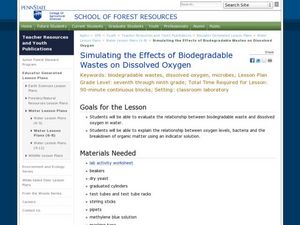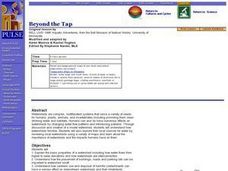Curated OER
Wetlands/Watershed Model
Students make a model that will demonstrate the flow of surface water across the land in Texas and how materials that originate many miles away can end up in the wetland along the coast.
Curated OER
Pauli's Magical Water
Students predict the shape of molecules using VSEPR theory. In this chemistry lesson, students differentiate a polar and nonpolar molecule. They discuss why water's polarity is very important.
Curated OER
Culmination of Mighty Waters
Third graders investigate the concept of bodies of water. The information is obtained from the internet while conducting research. Then students draw upon prior knowledge from a film to combine information for the purpose of creating a...
Curated OER
Car Wash
Students determine the most appropriate site for a car wash, based on each site's soil characteristics (chemical, physical) and topographic features. They perform an experiment to determine the changes to three different soil types when...
Curated OER
ESL Picture/Idiom Matching Worksheet
In this ESL picture to idiom matching worksheet, students examine 7 small clip art images before matching them to the idioms they best represent. They work with idioms such as "blood is thicker than water," and "as you make your bed, so...
Curated OER
Underwater Sea Garden: Washes
After modeling by the instructor, young artists practice wash, wet-on-wet, wet-on-dry, and dry-on-dry painting techniques.
Curated OER
Biochemistry Assignment
In this biochemistry worksheet, students complete a table by filling in the missing information about different elements. Students draw the Bohr diagram and the Lewis dot diagram for several atoms.
Curated OER
Potato Fish Adaptations
Students examine fish adaptations. They identify types of adaptations, and create a 3-D model of an imaginary fish that demonstrates various adaptations using a potato and craft materials.
Curated OER
Chemical Bonding
Eighth graders identify the three main types of chemical bonds. In this chemistry lesson, 8th graders draw Lewis dot diagrams of elements and determine the bond formed. They create a model water molecule.
American Museum of Natural History
A Whale of a Tale
What's the most interesting fact about a blue whale? Learners read an interview about the similarities between the Titanosaur and the blue whale displays at the American Museum of Natural History. Pupils learn not only about blue whales...
Minnesota Literacy Council
Regular Verbs Simple Present and Simple Past Tenses
Class members listen as the instructor reads pairs of sentences that contain the simple present and simple past tense of the same verbs.
Curated OER
Planning a Healthy City
Ninth graders create a scaled model city. They create a blueprint that provides for the economic and cultural needs of a community. They identify where essential elements of the city should be located and explain the rationale for the...
Curated OER
Evaporation Introductory Lesson
Fourth graders examine the concepts of evaporation and the water cycle. They describe the relationship between heat energy, evaporation and condensation of water on Earth and identify the sun as the source of energy that evaporates...
Curated OER
Swimming With the Crabs!
In this environmental science worksheet, students complete a graphic organizer (Frayer model) on blue crabs. They write an article using the given facts.
Curated OER
Design a Plankton
Students explore animal and plant adaptation. In this ecosystems science lesson, students view websites to gain information about plankton and its interdependence within ecosystems. Students identify ways in which plankton...
Curated OER
Weighing a Dinosaur
Young scholars role play as paleontologists who make inferences about the weight of dinosaurs. They use models and the density of water to make these inferences.
Pennsylvania Department of Education
Volume of Regular and Irregular Objects
Fifth graders examine patterns and relate to equations to solve math problems. For this patterns lesson, 5th graders diagram, graph, use models and use tables to solve equations for real world problems.
Curated OER
Create a Cloud In a Jar
Students investigate cloud formation. For this weather lesson, students examine how clouds are formed. Students participate in experiments that model how water vapor in the air works.
Curated OER
Chromosome Karyotyping
High schoolers explore chromosome karyotyping. In this chromosome karyotyping lesson plan, students use a chromosome kit to explore chromosome syndromes and disorders. They also produce a large model of a cell with chromosome to simulate...
Curated OER
Simulating the Effects of Biodegradable Wastes on Dissolved Oxygen
Students evaluate the relationship between biodegradable waste and dissolved oxygen in water. In this biodegradable wastes lesson students complete a lab activity in groups then analyze their results.
Curated OER
Backwards Goes It Does
Students create a three-dimensional model of the Chicago river watershed to determine the flow of the river at its mouth. They use prepared clear gelatin and topographic maps to discover that the building of canals actually reversed the...
Curated OER
Beyond the Tap
Learners explain the basic properties of a watershed including how water flows from higher to lower elevations and how watersheds are interconnected. They comprehend how the placement of buildings, roads, and parking lots can be...
Global Oneness Project
A Vanishing Island
The effects of rising sea levels on Isle de Jean Charles, located off the coast of Louisiana, are documented in Emmanuel Vaughan-Lee's poignant short video. Viewers are asked to consider not only the plight of residents but also what...
EngageNY
Relationships Between Quantities and Reasoning with Equations and Their Graphs
Graphing all kinds of situations in one and two variables is the focus of this detailed unit of daily lessons, teaching notes, and assessments. Learners start with piece-wise functions and work their way through setting up and solving...

